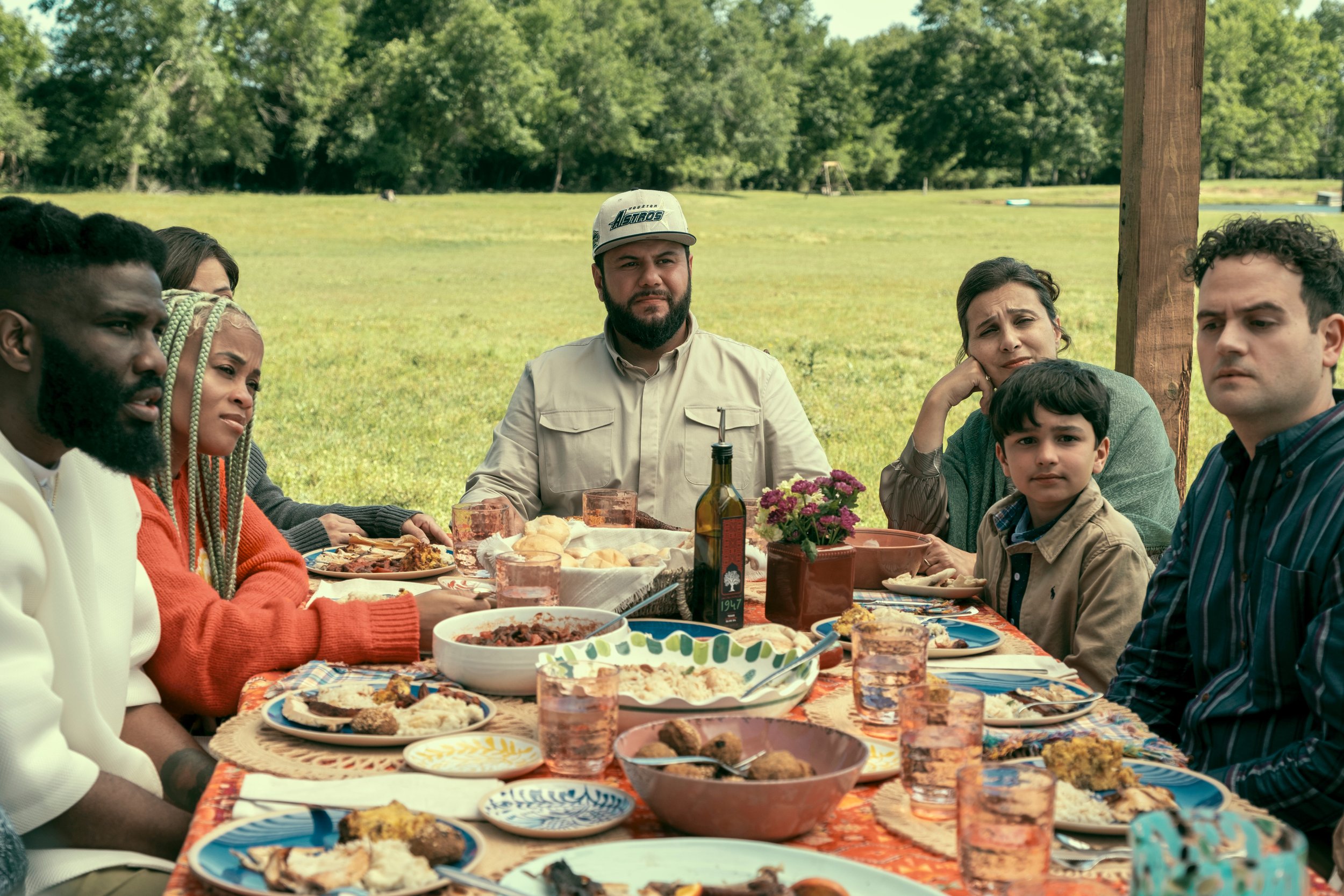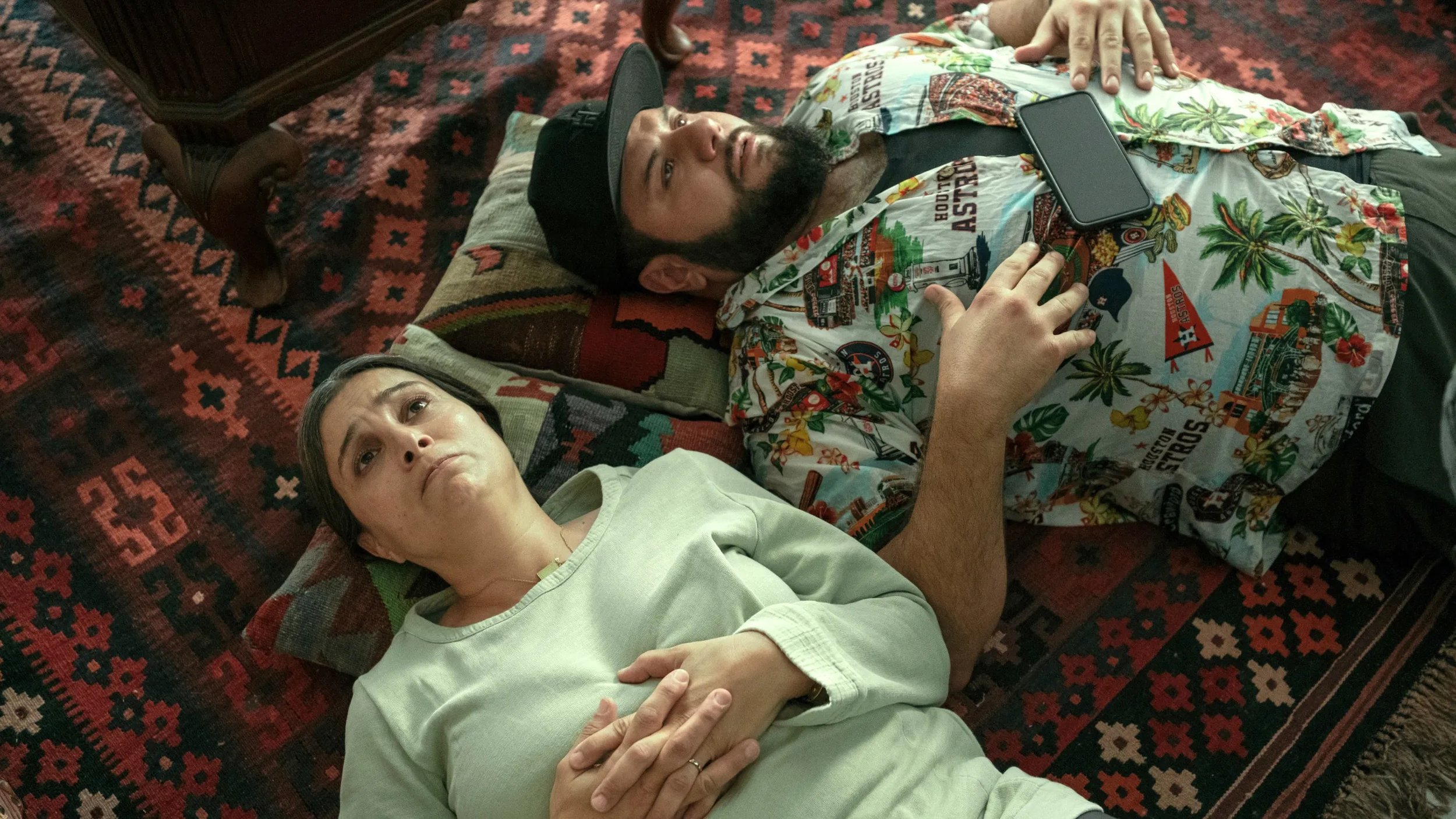Palestinian Love and American Bureaucracy in “Mo” (2022–)
About ten years ago, I attended a backyard comedy show in Los Angeles called Brew HaHa. The host, Brad Silnutzer, introduced the first comedian of the night, a man in a long trench coat named Mo Amer. I hadn’t heard of him before. Neither, it seemed, did most of the audience. He began his set by telling us that Mo is short for Mohammed, then shouted “Surprise, motherfuckers!” He kept screaming and opened his coat as if to reveal a suicide bomb. The crowd lost it—we were his for the rest of the set. In starting us off with a big laugh at an ugly stereotype of his community, he opened up a space to paint a different picture, the one missed by media narratives and other propagators of this stereotype.
Amer has continued to do this in the time since that show—on tour opening for Dave Chappelle, through two comedy specials of his own and now in his TV series, Mo, whose second season premiered on Netflix in February 2025. The show tells a fictionalized version of the story of his family: Palestinians from Burin, a town in the West Bank. They were living in Kuwait at the time of the Gulf War and sought asylum in Houston, Texas, in 1990, when Amer was nine. The process lasted almost twenty years—Amer wasn’t granted US citizenship until 2009. While this is not the first autobiographical comedy show about the U.S. immigrant experience (Fresh off the Boat, Jane the Virgin), the way the show’s team uses the specifics of Amer’s story to peel back the passing prejudices against his community is what makes Mo special.
The surreality of the U.S. immigration bureaucracy is a central object of the show’s humor. In the first season, the Najjars—the fictionalized family name for Mo, his mother Yusra (played by Farah Bsieso), and older brother Sameer (Omar Elba)—are in the midst of their asylum case. Anyone who has gone through the U.S. immigration system will relate to what they endure: the frustrations of lawyer shopping; the obtuseness of bureaucrats; the fear that a missed document or a clerical error will ruin an appointment that typically takes months or years to obtain. (The Najjars nearly miss their asylum hearing due to an officer who is “known for his clerical errors.”) Season Two peels back new levels of the system’s absurdity as Mo finds himself deported, but, since the U.S. government does not recognize Palestine as a state, they have nowhere to deport him. He is forced to remain in Houston with an ankle bracelet that an ICE officer surveils.
That image of Mo wearing the bracelet, the officer speaking through it at will, bluntly shows the degree to which government rules and systems shape life for migrants and refugees. This day-to-day constraint makes Mo’s need to defend and preserve his culture all the more anxious. He carries olive oil with him wherever he goes. “You just insulted my grandmother,” he tells a grocery store clerk who offers him a sample of chocolate hummus. He makes a scene in an Israeli restaurant when he finds falafel tacos, a plate Mo once sold street side, on the menu, accusing the chef of stealing it. It isn’t until the second season’s emotional final episode, when he and the family are able to go back to their village in Palestine, that he understands that, regardless of institutional dictates and steel-hearted immigration officers, his roots are always there. They are part of the blood that runs through him; there’s no need to grasp for them as if they’re slipping away.
For that reason, I often found myself moved by the show’s portrayal of Islam. The religion’s references and rituals, from the custom of removing one’s shoes inside the house to the words of certain prayers, flow through the family’s day-to-day without apology or explanation, as natural as Houston barbecue. In many TV shows, religious people are portrayed as either intolerant zealots or as agnostics who participate reluctantly in their family’s culture. Here, there’s no agenda to the Najjars’ religiosity. The show doesn’t attempt to qualify or apologize for the family’s beliefs. At the end of one episode, Mo, his brother, and his sister stand over their father’s grave, hold out their hands, palms up, and chant together, “Alhamdulillahi Rabbil-‘alamin,” Praise be to Allah, Lord of all that exists. They don’t explain the prayer for non-Muslim viewers. It doesn’t feel like an attempt to correct harmful Muslim stereotypes—it feels no different than the familiar scenes of families saying Grace that we are used to watching on American television.
In the last year and a half, it seems as if any statement acknowledging Palestinian humanity and history has been subject to censorship. The Board of Directors of the Columbia Law Review crashed their own website when the editorial staff published an essay about the Nakba. The editor-in-chief of Artforum was fired for signing an open letter supporting Palestinian freedom. The list goes on. As such, it is cathartic to see such a warm, honest portrayal of a Palestinian family—indeed, the only current portrayal of a Palestinian family—on American television. But it would be a mistake to view the show solely through the lens of recent events. While the final episode of the second season makes a passing reference to October 7th, the writers wisely place its eight episodes before that fateful date. In so doing, they give us the sense that the story could happen at any time.
That is as it should be. US audiences have long been deprived of access to stories and opinions about Palestinians made by Palestinians. In 2020, for example, when journalist Maha Nassar conducted a study of opinion pieces in major US newspapers, she found that from 1970 to 2019, the New York Times published 2,490 pieces about Palestinians, but only 46 of those were written by Palestinians. The US has long needed a TV series about a Palestinian family—one fronted by a Palestinian, one that feels familiar and relatable, yet stays true to their culture without watering it down.
This makes it somewhat frustrating that the show runs on Netflix at a time of deeply fragmented viewing habits. These are not the times when over 20 million people would watch new episodes of the same show every week simply because that was what the networks curated. A show like Mo might have been greatly impactful under such a system, the Najjars as familiar and accepted as the Cosbies or the Keatons. Streamers instead try to be all things to all people, carve out secret corners where the like-minded converge. In this landscape, the kind of consistent, widespread presence and acceptance that shapes hearts and minds is nearly impossible to achieve.
Regardless, I hope that the audience for Mo will continue to grow, that people might continue to stumble upon it. They are sure to find that they can enjoy their time with a Palestinian family regardless of the malignant perceptions the national media has endeavored to shape; that immigrants are just trying to navigate a convoluted system that often sets them up for failure; that they can sympathize and laugh alongside the cultural and bureaucratic struggles of a refugee.
Surprise, motherfuckers.





